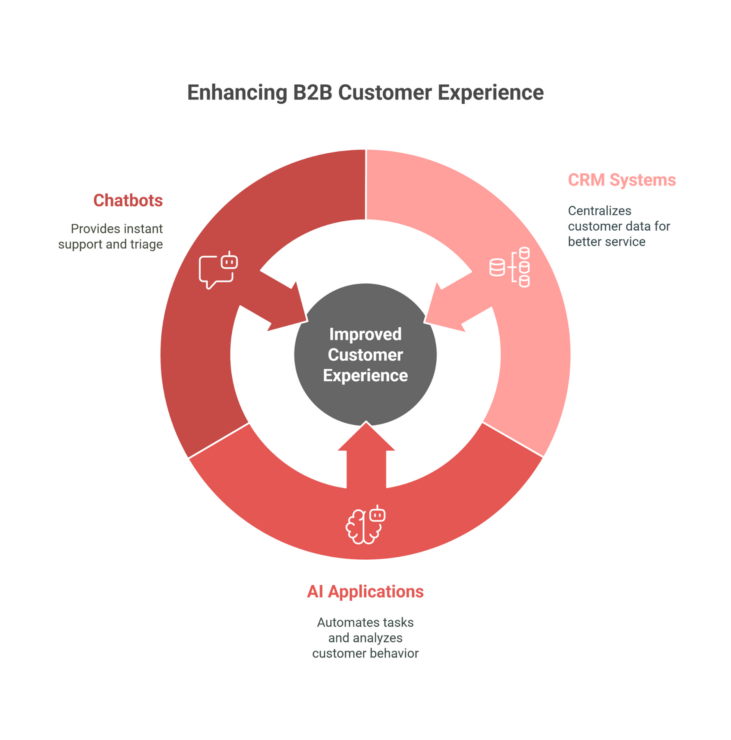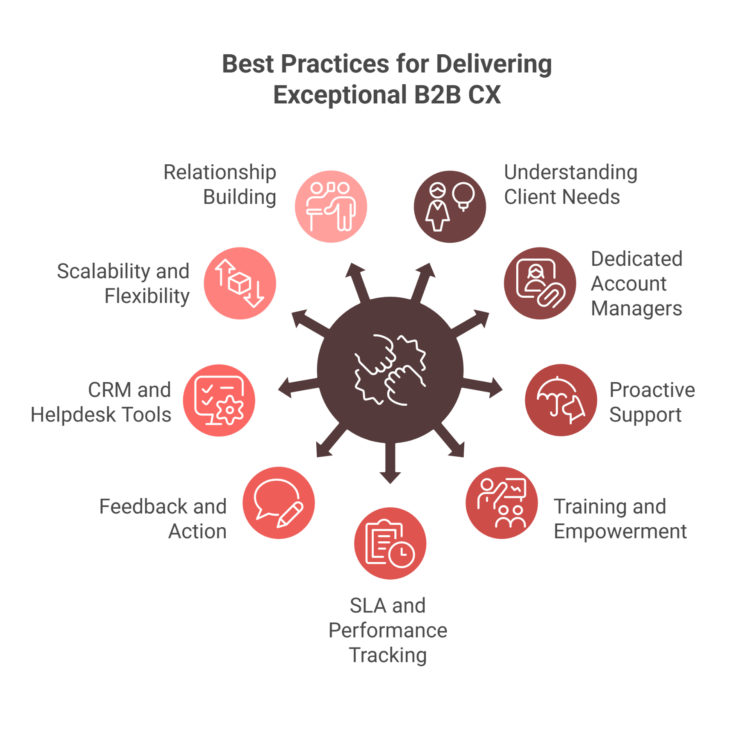Read Time: 13 minutes
Table of Contents
Introduction
For any business that works directly with other businesses, business-to-business (B2B) customer service is a crucial part of business strategy, affecting everything from client retention to long-term revenue. Today, we’re taking an in-depth look at the ins and outs of B2B customer service, from how to ensure B2B success to how quality B2B customer service affects your performance, as well as the best ways to ensure an excellent customer experience for your B2B clients.
Key takeaways
- Communication, relationship building, and personalization: Though all customer service needs these components, they are crucial for B2B customer service due to the high stakes and complex needs involved in customer interactions.
- Use of tech: Tools like CRM systems, AI, chatbots, and analytics enable a higher quality of customer support.
- Direct effect on business success: Better B2B customer service directly drives the success of B2B businesses by boosting client retention and lifetime value, as well as promoting positive word-of-mouth and referrals.

What is B2B customer service?
B2B customer service is the customer support and care that a business provides to other client businesses.
Often, the term “customer service” brings to mind the work that business-to-consumer (B2C) companies.
While B2C and B2B customer service are essentially the same concept (handling inquiries, resolving problems, providing technical guidance for products and services, etc.), B2B customer service has it’s own unique challenges, from higher financial stakes and more stakeholders, to the complexities of the B2B sales cycle, just to name a couple.
Key components of effective B2B customer service
Communication best practices
Clear and professional communication, delivered consistently, is a must in a B2B setting.
The higher expectations of the B2B world mean that B2B customer service should be conducted with a strong understanding of the client’s business, timely updates, transparency regarding important timelines, and proactive communication to prevent small problems from growing.
Building long-term relationships
B2B customer service has a greater emphasis on developing long-term relationships with clients.
The high stakes involved in these partnerships demands a certain level of mutual trust, respect, and accountability to accomplish a truly exemplary B2B customer experience.
When clients know that they can trust you with certain mission-critical aspects of their business, it allows for more effective work to be done, and a higher lifetime-value for the partnership.
Personalization in business to business service
Though personalization is also a good idea for B2C customer service, it’s a crucial aspect of B2B.
At the scale of an entire business, there are often complex systems and protocols already in place that make one-size-fits-all solutions ineffective for B2B customer service.
By personalizing your approach, you can provide a more engaging experience for B2B clients, sending the message that you have their long-term success in mind.
Examples of success in B2B customer service
Innovative customer support strategies are instrumental in instrumental in B2B customer service success.
Here are a couple scenarios where Global Response was able to oversee successful B2B customer service in action.
Case study: A SaaS company’s approach
One tech company that worked with Global Response was initially struggling to provide B2B support after a massive expansion.
The company, who provides SaaS solutions to schools, had recently gone from serving 50,000 schools to 60,000, and that scaling created growing pains for their internal customer support.
Support staff were overloaded with calls, wait times went up, and many support issues were being escalated.
With the assistance of Global Response, the company was able to overcome these challenges, mainly through outsourcing with Global Response and expanding its training program.
With a dedicated support team focusing on product knowledge and relationship building, as well as a newly enhanced training program boosted from 3 days to 2 weeks, the company was able to make significant improvements.
Average speed of answer (ASA) was reduced by 45% and escalations were dramatically reduced, all of which resulted in service levels exceeding expectations at 83% and client retention increasing by 2%.
Case study: Automotive B2B solutions
An automotive marketing and CRM company was a victim of their own success. Partnering with a large number of dealerships meant a lot of business, but the workload this produced quickly became difficult to manage.
Meeting the needs of the company’s many partners was a struggle with their workforce and resources, resulting in lost sales and customer dissatisfaction.
Global Response was able to efficiently scale the company’s workforce by deploying agents in the Philippines and the US, which greatly increased their call capacity while lowering overhead costs.
Next, Global Response enhanced the company’s tracking and performance by integrating the company’s CRM system with Global Response’s telephony system, ensuring that each call was managed and monitored.
Finally, the company’s training program was revamped, making sure that each agent was trained on the company’s CRM and other vital systems.
These changes nearly tripled the number of appointments that the company was able to set for its partnered dealerships, all while maintaining a high quality of service.
Want to scale your business?
Global Response has a long track record of success in outsourcing customer service and call center operations. See what our team can do for you!
Leveraging technology for a better B2B customer experience
Your use of technology can greatly benefit your B2B clients.
Three technologies that are particularly useful in this context are robust CRM systems, smart use of AI, and chatbots.

1. Implementing customer relationship management (CRM) systems
A robust CRM is an extremely valuable tool for any customer service operation, and B2B is no different.
With a quality CRM in place, all team members, from sales to support to operations, can easily see the client’s full interaction history.
This can be particularly useful in B2B, where interaction history can be very long-term, and the interactions themselves can be fairly complex from a technical or logistical perspective.
2. The role of artificial intelligence in B2B customer service
AI has great potential as tool for B2B customer service.
Some applications include, analyzing customer behavior, uncovering trends, flagging high-risk accounts, or even automating common or tedious tasks.
AI-powered call routing and speech analytics are also incredibly useful to provide customers with the agent best suited to their needs and track performance effectively once they get there.
3. Utilizing live chat and chatbots for instant support
Chatbots are a convenient way to gather information about a customer’s inquiry and provide them with basic help right off the bat.
Chatbots can act as a first line of defense, answering the most frequently asked questions effectively and performing triage based on customer needs.
When necessary, a human agent can step in for a live chat to clear up more technical questions or de-escalate more tense or high-stakes interactions.
READ MORE: How To Create a Winning B2B Customer Service Strategy
Actionable best practices for enhancing B2B customer care
Here are just a few tried and true strategies that allow B2B businesses to raise the quality of their customer service.
Developing a robust customer feedback mechanism
Understanding your customers’ perspective on their experience is always valuable.
By putting a direct customer feedback mechanism in place, such as surveys, NPS scores, and speech analytics, you can get an in-depth look at what clients enjoy about their experience and what needs work.
Training and empowering customer service teams
The agents who represent your business are the face of your brand, so it’s smart to equip them with the skills and product knowledge they need to confidently handle a wide variety of customer support scenarios.
Emphasizing proactive customer engagement
Proactive engagement is essential, as it shows your B2B clients (for whom your working relationship often has high stakes) that you not only value their partnership, but also want to see them succeed.
Proactive customer engagement allows you to stay up to date with their current needs and solve smaller problems before they grow.

Why B2B customer service matters for business performance
Stellar B2B customer service has a direct effect on a business’s long-term success.
Here are just a few ways that improving your B2B customer experience can influence your organization.
Increases customer retention
When customers are satisfied with your support and feel like they can trust you as a partner, they are more likely to stick around.
Due to the nature of the partnership, B2B clients in particular need to be certain that you have their back and can do what you’ve promised for them.
If you can provide excellent service to these clients, you set yourself up for long-term success, retaining recurring revenue and strengthening your reputation.
Drives higher lifetime value
As you consistently deliver high-quality service to your B2B clients, continuously impressing them with your ability to deliver results that live up to your promises, those clients are often more open to trusting you with more work.
By providing your best service, you can encourage B2B clients to extend your working relationship and even upsell and cross-sell opportunities.
Boosts referral and word-of-mouth growth
A satisfied B2B client is an excellent brand advocate. When you optimize your customer experience for them, your clients are more likely to give you positive word of mouth and refer their peers.
Reduces churn and acquisition costs
Acquiring new clients is always a more expensive proposition than retaining the ones you already have.
It can take a significant amount of time, effort, and money to court potential clients before they decide to sign on, so when you provide an excellent customer experience, you’re more likely to keep the clients you already have, reducing the the need to replace lost business.
Improves data-driven insights
Every time you interact with a client, there is new and valuable data being produced, and you can use it to strengthen your customer service.
By tracking and paying attention to the most common issues your clients present, resolution times, and satisfaction scores, you can use those insights to make informed decisions for your business, tweak your customer experience strategies, and forecast future needs.
Strengthens competitive advantage
B2B markets can be incredibly competitive, which makes it all the more important to show your clients and prospects why you’re the partner they need.
By being proactive, responsive, flexible, and reliable, you are able to illustrate that special something that sets you apart from the competition, making prospects more likely to choose you over your competitors and you’ll more easily hold onto the business of current clients.
Encourages strategic partnerships
A B2B client doesn’t want a merely transactional relationship.
It’s important to cultivate a partnership that fosters trust, collaboration, and shared success.
When clients see you as more of a strategic ally than someone they do business with, it’s far more likely that they will keep you in mind as they make future plans, fostering long-term working relationships.
Best practices for delivering exceptional B2B CX

For the best B2B customer service strategy, it’s imperative for companies to build strong working relationships with their clients. These are some of the best ways to ensure that you deliver an exceptional B2B customer experience:
- Understand your clients’ business needs: The more in touch you are with your clients’ industry, the pain points they experience, and their goals for the future, the better you can align yourself with those needs.
- Assign dedicated account managers: With one central point of contact, you can give your clients stability, consistency, and a sense of trust in your brand.
- Implement proactive support: It’s not enough to react to problems as they crop up. Clients might hold back asking for help until they feel it’s “worth it” to reach out, so it’s important to keep dialogue open and anticipate customer needs through effective use of analytics and forecasting, providing support before concerns become full-blown problems.
- Invest in training and empowerment: Give your team the tools, knowledge, and authority that they need to act quickly and effectively. When your team feels empowered to go above and beyond, your customers benefit greatly and are more likely to feel trust and confidence in your team’s value.
- Use SLAs and track performance: By sharing SLA metrics with clients, you can foster transparency and trust while providing a framework for identifying gaps, continual improvement, and celebrating wins along the way.
- Gather and act on feedback: In order to strengthen your working relationships and improve customer service, it’s crucial to gather feedback and act on it to not only show your clients that their voice matters, but also to tangibly improve the quality of your products and services.
- Leverage CRM and helpdesk tools: With the help of modern CRM tools, your team can effectively streamline customer communication, track service tickets, and efficiently share information with the whole team for a more cohesive customer experience.
- Support scalability and flexibility: A flexible service model and infrastructure is essential for meeting increased demand on your support team or rolling with the punches during seasonal or promotional demand spikes.
- Focus on relationship building: At the end of the day, the most important part of an exceptional B2B customer experience is to emphasize strong, long-term working relationships. When you understand your customer’s business goals and relate to them as a person, you go beyond a simple business partner and become an extension of their team.
Conclusion: Driving success through excellence in B2B customer service
To reliably create growth, retention, and customer satisfaction, quality B2B customer service is an essential function of your business.
B2B companies that strive for clear communication, long-term customer relationships, and smart use of tech in their customer service can set themselves head and shoulders above the rest.
By partnering with Global Response for your B2B customer service, you can easily scale your operations and foster long-term relationships with your clients through a dedicated team of B2B call center experts.




